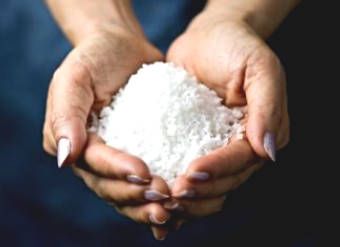
Health organizations have warned us about the danger from salt for a long time.
It is due to high salt intake which has been claimed to cause some health problems, including high blood pressure and cardiovascular disease.
However, decades of research have not provided convincing evidence to support this .
Moreover, many studies actually show that eating too little salt can be harmful.
This article gives a detailed look at salt and its health effects.
What is salt?
Salt is also called sodium chloride (NaCl). It contains 40% sodium and 60% chlorine by weight.
Salt is the largest source of sodium, and the words "salt" and "sodium" are often used interchangeably.
Some salts may contain calcium, potassium, iron and zinc. Iodine is often added to table salt .
Essential minerals in salt act as an important electrolyte in the body. They help balance fluid, neurotransmitters and muscle function.
An amount of salt is found in most foods. It is also often added to food to increase flavor.
Historically, salt has been used to preserve food. A large amount of salt can prevent the growth of bacteria that cause food spoilage.
Salt is harvested in two main ways: from salt mines and by evaporation of seawater or other mineral-rich waters.
There are actually many types of salt. Common types include table salt, Himalayan pink salt and sea salt.
This is the common salt: 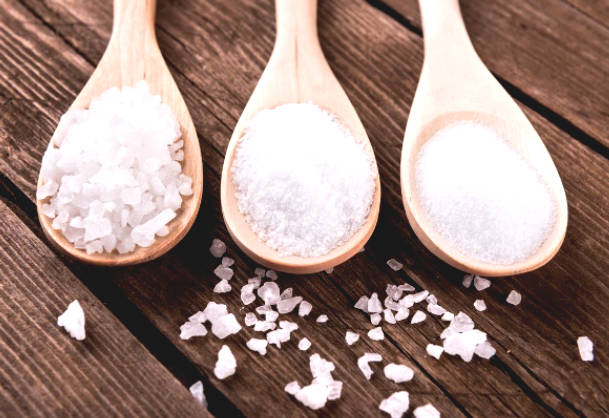
Different types of salts may differ in taste, texture and color. In the image above, the salt on the left is raw sea salt, and on the right is refined salt.
In case you wonder which one is the best, the truth is they are all the same.
Summary: Salt consists mainly of two minerals, sodium and chlorine, which have different functions in the body. It is found naturally in most foods, and is widely used to increase flavor.
How does salt affect cardiovascular health?
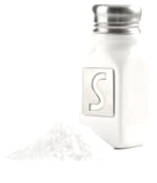
Health authorities have asked us to reduce sodium for decades. They say you should consume no more than 2,300 mg of sodium per day, preferably less .
This amount is about one teaspoon, or 6 grams of salt (containing 40% sodium, after multiplying the sodium grams by 2.5).
However, about 90% of adults in the US consume much more .
Eating too much salt is thought to increase blood pressure, thereby increasing the risk of heart disease and stroke.
However, there are some serious doubts about the true benefits of sodium restriction.
It is true that reducing the amount of salt can lower blood pressure, especially in people with a health condition called salt-induced hypertension .
However, for healthy individuals, the average reduction in blood pressure is difficult to see.
A study from 2013 showed that for people with normal blood pressure, limiting salt intake only made 2.42 mmHg lower systolic blood pressure and 1.00 mmHg diastolic blood pressure .
That's like dropping from 130/75 mmHg to 128/74 mmHg. This is not exactly the impressive result you hope to get from maintaining a bland diet.
Furthermore, some review studies found no evidence that limiting salt intake would reduce the risk of heart attack, stroke or death .
Summary: Limiting the amount of salt you eat will slightly lower your blood pressure. However, there is no clear evidence linking reduced salt intake with the risk of heart attack, stroke or death.
Low salt consumption can be harmful
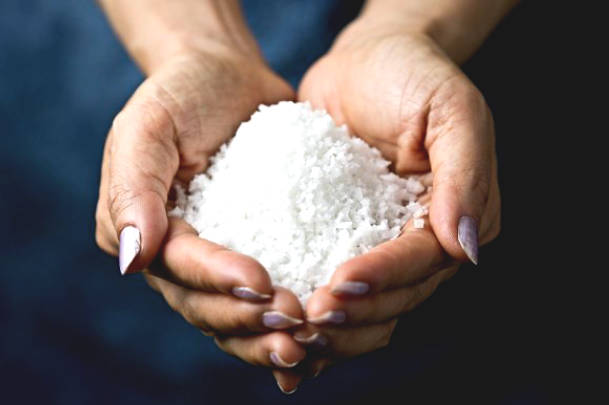
There is some evidence that a low-salt diet can be harmful.
Negative health impacts include:
- Increased LDL and triglyceride cholesterol: Limiting salt is associated with an increase in LDL ("bad") cholesterol and triglycerides .
- Heart disease: Some studies report that less than 3,000 mg of sodium per day is associated with an increased risk of death from heart disease .
- Heart failure: An analysis shows that limiting salt consumption increases the risk of death in people with heart failure. With a 160% higher risk of death in people who reduce salt intake, it is an amazing impact .
- Insulin resistance: Some studies show that a low-salt diet may increase insulin resistance .
- Type 2 diabetes: One study found that low-sodium patients were associated with an increased risk of death in patients with type 2 diabetes .
Summary: Low-salt diets are associated with higher levels of LDL and triglycerides and insulin resistance. It may increase the risk of death from heart disease, heart failure and type 2 diabetes.
High consumption of salt is related to stomach cancer
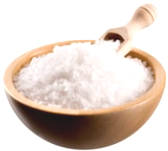
Stomach cancer is the fifth most common cancer.
This is the third most deadly cancer worldwide, and is responsible for more than 700,000 deaths a year .
Several observational studies related to high salt diets with increased risk of stomach cancer .
A major scientific article from 2012 looked at data from 7 prospective studies, including a total of 268,718 participants .
It found that people who ate more salt had a 68% higher risk of stomach cancer than those who consumed lower amounts.
Exactly how and why this happens is not well understood, but there are several theories that exist:
- Increasing bacteria: High salt intake can increase growth Helicobacter pylori , a bacterium that can cause stomach ulcers. This may increase the risk of stomach cancer .
- Damaged endothelium: A high salt diet can cause damage and inflammation of the lining of the stomach, so it is easy to expose it to carcinogens .
However, keep in mind that these are observational studies. They cannot prove high consumption of salt in stomach cancer, only these two issues are closely related.
Summary: Some observational studies have linked high salt intake with an increased risk of stomach cancer. This can be caused by many factors.
What foods are high in salt / sodium?

Most modern dietary salt comes from food in restaurants or from prepared foods.
Actually, estimated about 75% American dietary salt is from processed foods. Only 25% of natural consumption is in food or added during cooking or at the table .
High-salt snacks, instant canned soups, processed meats, fermented foods and soy sauce are examples of high-salt foods.
There are also some non-salty foods that actually contain a lot of surprising salt, including bread, fresh cheese and some breakfast cereals.
If you're trying to cut, read the food label because it almost always lists sodium content.
Summary: High-salt foods include processed foods, such as salted snacks and instant soup. Foods like bread and cottage cheese, can also contain a lot of salt.
Should you eat less salt?
Some health conditions need to cut salt. If your doctor wants you to limit salt consumption, then you should definitely continue to do it .
However, if you are a healthy person eating most of the pure food and Single component then perhaps you don't need to worry about salt consumption.
In this case, you can freely add salt while cooking or at the table to add flavor.
Eating too much salt can be harmful, but eating too little is not good for health .
As usual, in nutrition, optimal consumption is usually in the middle.
